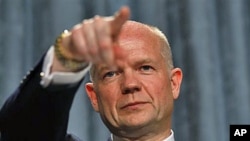British Foreign Secretary William Hague said international troops are making steady progress in Afghanistan, but corruption in the country remains a serious obstacle.
Hague told the House of Commons in London on Wednesday that international forces in Afghanistan have made gains. "Afghan and ISAF forces have checked the momentum of the insurgency and the area under the control of the government of Afghanistan is increasing."
He said the British government is confident that it has the right military strategy in place. He also said, however, that violent incidents are increasingly common. "One of the effects of increased military activity is that the number of security incidents, particularly those involving direct fire, has increased sharply."
Head of Britain's armed forces, Sir Jock Stirrup, spoke Wednesday to the BBC. Stirrup said he doesn't expect to see the bulk of British troops leave Afghanistan for at least four years. He said the future of Afghanistan remains uncertain.
"All of the progress that I see in Afghanistan - and I do see progress, there's no doubt about that - is far from irreversible," said Stirrup. "And we have to sustain the commitment. We have to sustain the pressure."
Stirrup is due formally to stand down as Chief of the Defense Staff at the end of this week. He's to be replaced by General Sir David Richards.
Afghanistan's president, Hamid Karzai, has come under fire this week after admitting that his chief of staff received money from Iran in bundles of cash. Karzai said the transaction was completely transparent.
But Secretary Hague said corruption remains a major issue in Afghanistan, despite efforts to combat the problem.
Wyn Rees is a Professor in International Relations at Britain's University of Nottingham. He said although international forces appear to be making some military progress, the political situation in Afghanistan does not seem so positive. "Against that, you'd have to look at the political picture and say that continuing problems with the extent to which the Karzai government is seen as being the right partner with which to work."
Meanwhile, Britain's Ministry of Defense has released details of incidents in which British troops attacked Afghan civilians. The incidents were among thousands mentioned in U.S. army logs posted by the whistle-blowing website WikiLeaks earlier this year.
WikiLeaks last week posted a new group of almost 400,000 secret war logs related to the war in Iraq.
A top United Nations official called Tuesday on the U.S. government to investigate the role of U.S. forces in human rights abuses in Iraq. Navi Pillay said the latest documents released by WikiLeaks raise new questions about "serious breaches of international human rights law in Iraq."
British Government Says 'Progress Made' in Afghanistan




